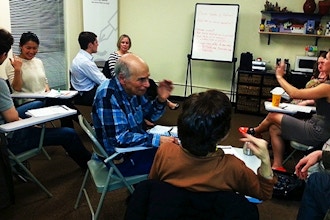The Spanish Civil War through Films and Literature II
- Intermediate
- 21 and older
- $145
- Earn 1,450 reward points
- 10 E 39th St, New York, NY
- over 5 sessions
The Spanish Civil War is without a doubt the most dramatic and transcendental episode in the history of Spain during the twentieth century. And as a prelude to World War II, it also had deep international repercussions. Likewise, from the beginning this armed conflict left an impact in the artistic community, as we can see reflected in such works as Pablo Picasso’s Guernica, films, countless stories, poems, novels and the commitment of writers and poets who were either fighting at the front lines or taking sides.
In this course we’ll learn that the Spanish Civil War did not end with the defeat of the Republican army in 1939, but that the fight continued practically until the death of Franco (1975). Many Republicans continued to fight in the mountains, woods, and even in the big cities. The anti-fascist fight also continued in France where the Republican soldiers joined the French resistance against the Nazis, while the Republican government remained in exile until the arrival of democracy. On the other hand, after the war ended, concentration camps and mass graves for the over 50.000 executed people imprisoned by Francoist Repression spread all over Spain. In this course, we will the study the Spanish Civil War and its consequences through the best short stories, texts, movies and documentaries. We will focus on the end of the war, the repression, the republican exile, and the sequels of the war throughout Spain and Hispanic America.
Pre-requisite: You must be at least a Higher Beginner to better enjoy this course.
This course is available for "remote" learning and will be available to anyone with access to an internet device with a microphone (this includes most models of computers, tablets). Classes will take place with a "Live" instructor at the date/times listed below.
Upon registration, the instructor will send along additional information about how to log-on and participate in the class.
Refunds
Please note that all lessons taken by the student’s program will be discounted from the refund and charged as single sessions and there’s a $35 processing fee.
Rescheduling and Cancellations
In any event where a customer wants to cancel their enrollment and is eligible for a full refund, a 5% processing fee will be deducted from the refund amount.
Get quick answers from CourseHorse and past students.
People who viewed this class also viewed the following classes
Easy Español is a boutique institute offering premium-quality Spanish language instruction. Easy Español stands out from other language schools in four key ways by offering:

This school has been carefully vetted by CourseHorse and is a verified Online educator.

Booking this class for a group? Find great private group events



More in Life Skills




Get special date and rate options for your group. Submit the form below and we'll get back to you within 2 business hours with pricing and availability.